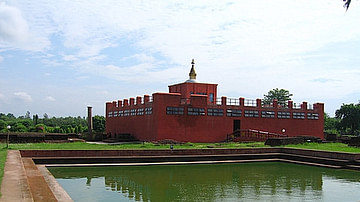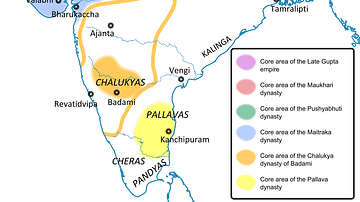Search
Did you mean: Bastet?
Search Results

Definition
Esoteric Buddhism
Esoteric Buddhism is the mystical interpretation and practice of the belief system founded by the Buddha (known as Sakyamuni Buddha, l. c. 563 - c. 483 BCE). It is known by several names and is characterized by a personal relationship with...

Definition
Soma - The Elixir of the Hindu Gods
Soma was a fermented juice drink which was believed to have been consumed by the Hindu gods and their ancient priests, the brahmanas, during rituals. Thought to be an elixir its consumption not only healed illness but also brought great riches...

Definition
Lumbini
Lumbini is a village, archaeological site, and place of pilgrimage honored as the birthplace of Siddhartha Gautama (the Buddha, l. c. 563-483 BCE) located in modern-day Rupandehi District of Nepal, Province 5, near the Indian border. It was...

Interview
Interview: Swallow's Dance by Wendy Orr
In this interview, Ancient History Encyclopedia is speaking with Wendy Orr, the rather prolific author of numerous books who has recently published the book Swallow's Dance. It is a book of historical fiction set in the Bronze Age Aegean...

Definition
Siddhartha Gautama
Siddhartha Gautama (better known as the Buddha, l. c. 563 - c. 483 BCE) was, according to legend, a Hindu prince who renounced his position and wealth to seek enlightenment as a spiritual ascetic, attained his goal and, in preaching his path...

Definition
Ashoka the Great
Ashoka the Great (r. 268-232 BCE) was the third king of the Mauryan Empire (322-185 BCE) best known for his renunciation of war, development of the concept of dhamma (pious social conduct), and promotion of Buddhism as well as his effective...

Definition
Bantu Migration
The Bantu migration from their origins in southern West Africa saw a gradual population movement sweep through the central, eastern, and southern parts of the continent starting in the mid-2nd millennium BCE and finally ending before 1500...

Definition
Maukhari Dynasty
The Maukharis (554 CE - 606 CE) rose as a power after the downfall of the Gupta Empire (3rd to 6th century CE) in the 6th century CE in northern India. The core area of their kingdom was situated in what is now the state of Uttar Pradesh...

Definition
Battle of Cannae
The Battle of Cannae (2 August 216 BCE) was the decisive victory of the Carthaginian army over Roman forces at Cannae, southeast Italy, during the Second Punic War (218-202 BCE). The Carthaginian general Hannibal Barca (l. 247-183 BCE), who...

Definition
Romani
Romani is an umbrella term used to describe a diverse ethnolinguistic group of people with a historical presence in Europe and West Asia. The historically common term 'Gypsy' is based on the myth that they came from Egypt. In reality, the...